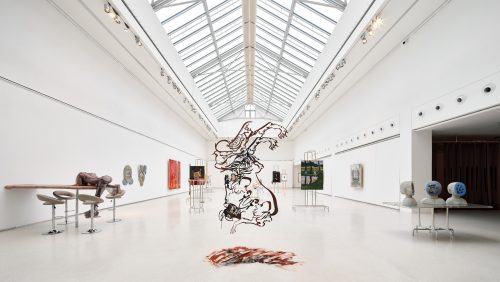
Maximiliane Baumgartner
Das Lokale ist nicht lokal
Project Info
- 💙 Kunstverein Nürnberg - Albrecht Dürer Gesellschaft
- 💚 Nele Kaczmarek
- 🖤 Maximiliane Baumgartner
- 💜 Nele Kaczmarek and Maximiliane Baumgartner
- 💛 Lukas Pürmayr
Share on

1_ Maximiliane Baumgartner, action wagon “Viele Vampire sind Vögel“, 2019, Banner print based on Dore Meyer-Vax’s draft for a ceiling painting in the Nuremberg Youth Library, 1956, photo ©Lukas Pürmayr
Advertisement

2_ Maximiliane Baumgartner, action wagon “Viele Vampire sind Vögel“, 2019, Banner print based on Dore Meyer-Vax’s draft for a ceiling painting in the Nuremberg Youth Library, 1956, photo ©Lukas Pürmayr

3_ Maximiliane Baumgartner, “Das Lokale ist nicht lokal“, (exhibition view), Kunstverein Nürnberg - Albrecht Dürer Gesellschaft, 2024, photo ©Lukas Pürmayr

4_ Maximiliane Baumgartner, “Das Lokale ist nicht lokal“, (exhibition view), Kunstverein Nürnberg - Albrecht Dürer Gesellschaft, 2024, photo ©Lukas Pürmayr

5_ Maximiliane Baumgartner, “Das Lokale ist nicht lokal“, 2023/24, multi-part installation, aluminum dibond, colored pencil, paper with frieze of 17 drawings, photo ©Lukas Pürmayr

6_ Maximiliane Baumgartner, “Das Lokale ist nicht lokal“, 2023/24, multi-part installation, aluminum dibond, colored pencil, paper with frieze of 17 drawings, photo ©Lukas Pürmayr

7_ Maximiliane Baumgartner, “Das Lokale ist nicht lokal“ (detail), 2023/24, multi-part installation, aluminum dibond, colored pencil, paper with frieze of 17 drawings, photo ©Lukas Pürmayr

8_ Maximiliane Baumgartner, “Das Lokale ist nicht lokal“ (detail), 2023/24, multi-part installation, aluminum dibond, colored pencil, paper with frieze of 17 drawings, photo ©Lukas Pürmayr

9_ Maximiliane Baumgartner, “Das Lokale ist nicht lokal“ (detail), 2023/24, multipart installation, aluminum dibond, colored pencil, paper with frieze of 17 drawings, photo ©Lukas Pürmayr

10_Maximiliane Baumgartner, “XX“ from “Von einem Punkt aus der Vergangenheit, einen Punkt aus der Gegenwart malen (I)“, 2023, Lacquer on aluminum dibond, photo ©Lukas Pürmayr

11_ Maximiliane Baumgartner, “X“ from “Von einem Punkt aus der Vergangenheit, einen Punkt aus der Gegenwart malen (I)“, 2023, Lacquer on aluminum dibond, photo ©Lukas Pürmayr

12_ Maximiliane Baumgartner, “XXXX“ from “Von einem Punkt aus der Vergangenheit, einen Punkt aus der Gegenwart malen (I)“, 2023, Lacquer on aluminum dibond, photo ©Lukas Pürmayr

13_ Maximiliane Baumgartner, “XXXX“ from “Von einem Punkt aus der Vergangenheit, einen Punkt aus der Gegenwart malen (I)“, 2023, Lacquer on aluminum dibond, photo ©Lukas Pürmayr

14_ Maximiliane Baumgartner, “XXXX“ from “Von einem Punkt aus der Vergangenheit, einen Punkt aus der Gegenwart malen (I)“ (detail), 2023, Lacquer on aluminum dibond, photo ©Lukas Pürmayr

15_ 2024, Originals and reproductions of Dore Meyer-Vax’s work (Kunstvilla), newspaper articles, issues of tendenzen, conversation between M. Baumgartner and Wolfgang Brauneis, conversation between M.Baumgartner and Bernd Zachow

16_ 2024, Originals and reproductions of Dore Meyer-Vax’s work (Kunstvilla), newspaper articles, issues of tendenzen, conversation between M. Baumgartner and Wolfgang Brauneis, conversation between M.Baumgartner and Bernd Zachow

17_ Maximiliane Baumgartner, action setting “Das Lokale ist nicht lokal“, 2024, Based on Dore Meyer-Vax’s ceiling painting in the Nuremberg Youth Library, 1956, Material buffet, archival material on Dore Meyer-Vax, ©Pürmayr

18_ Maximiliane Baumgartner, action setting “Das Lokale ist nicht lokal“, 2024, Based on Dore Meyer-Vax’s ceiling painting in the Nuremberg Youth Library, 1956, Material buffet, archival material on Dore Meyer-Vax, ©Pürmayr

19_ Maximiliane Baumgartner, “Das Sprechende Eck III“, 2023/24, Two-part painting, lacquer on aluminum dibond, photo ©Lukas Pürmayr

20_ Maximiliane Baumgartner, “Das Sprechende Eck IV“, 2023/24, Two-part painting, lacquer on aluminum dibond, photo ©Lukas Pürmayr
Maximiliane Baumgartner’s works combine elements of
painting, radical pedagogy, and artistic research. Her
memory work opens up spaces of encounter, intergenerational
exchange, and practical references to history and its
blindspots. Based on the thesis “Das Lokale ist nicht lokal“
(The local is not local), Baumgartner’s most recent works
investigate the lives and works of women artists from the
so-called “lost generation” as documents of their time.
Many of these figures share the experience of being the
first generation of women artists to be admitted to German
art academies, and they often worked on the national
(not just local) level. Yet, their lives and work were interrupted
by the Second World War and National Socialism,
occasionally suppressed by exhibition bans and defamed
as degenerate. After 1945, their works remained largely
ignored in the national discourse.
In the course of her Marianne Defet Painting Scholarship,
Baumgartner studied the work of Nuremberg artist Dore
Meyer-Vax (1908–1980) in this context. Meyer-Vax trained
as a printmaker at the Kunstgewerbeschule Nuremberg
before transferring to the art academy in Berlin in 1929,
and shortly afterwards she also pursued her studies in
the studios of various artists, including Karl Hofer among
others. This was the environment where she met her future
husband Walter Meyer and became part of an artistic
scene around Felka Platek and Felix Nussbaum. From
1933 on, there were no longer any opportunities for her
to exhibit, so Meyer-Vax left Berlin in 1939 and returned
to Nuremberg, where she was employed as a technical
draughtswoman at the transformer factory. Shortly after
the war’s end, she joined the communist party (KPD),
which was soon banned, and became one of the founding
members of the Women’s International League for Peace
and Freedom. During this time, her political commitments
were reflected in numerous works as well as political campaigns.
From the 1950s on, Meyer-Vax was entrusted with
a series of commissions for public spaces in Nuremberg
and designed or executed murals for the youth library,
schools, the state theater, and the zoo, among others.
In several series of drawings and paintings, Baumgartner
responds to these social sites and the democratic pictorial
approach of Meyer-Vax’s works. In addition to political
commentaries on the events of her time, Meyer-Vax repeatedly
depicted situations of collective learning and solidarity
as well as moments of exhaustion, which Baumgartner
reconsiders in the context of today’s socio-political
debates and her own situated perspective. In her painterly
process of “looking at pictures through pictures,”
Baumgartner points out historical gaps without trying to
fill them. She also establishes a connection to the Freiburg
artist Eva Eisenlohr (1891–1977), who was affected by similar
patriarchal and political mechanisms of ignorance and
active forgetting. In the process, Baumgartner makes the
works of both artists legible within an expanded discursive
space: The local is not local.
As the title of the series “Von einem Punkt aus der Vergangenheit,
einen Punkt aus der Gegenwart malen“
(Re-painting the threads of the past) on display suggests,
Baumgartner makes temporal connections and critical
commentaries, the perspective of which she expands by
activating various groups in Nuremberg. To this end, she
will initiate a series of actions over the course of the exhibition,
which various groups and the public are invited to
participate in. The opening of the exhibition “Das Lokale ist
nicht lokal“ thus marks the beginning of these processes
of getting to know each other and working together.
Nele Kaczmarek and Maximiliane Baumgartner




